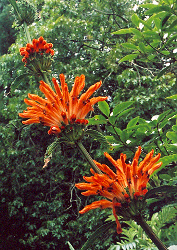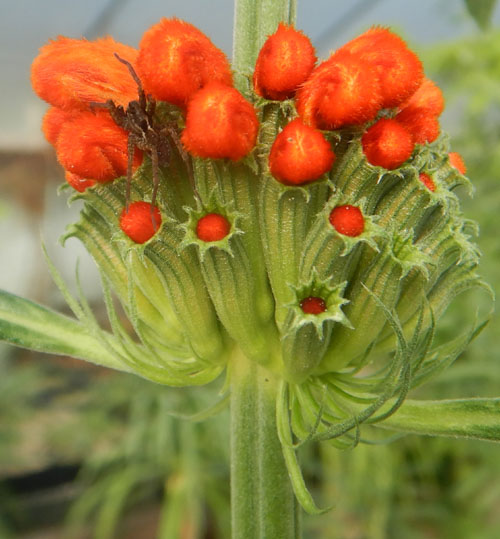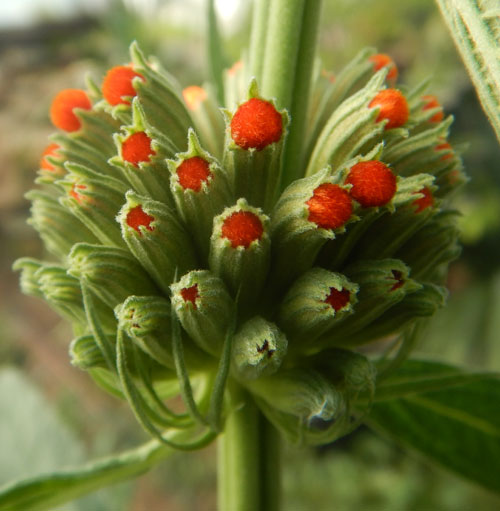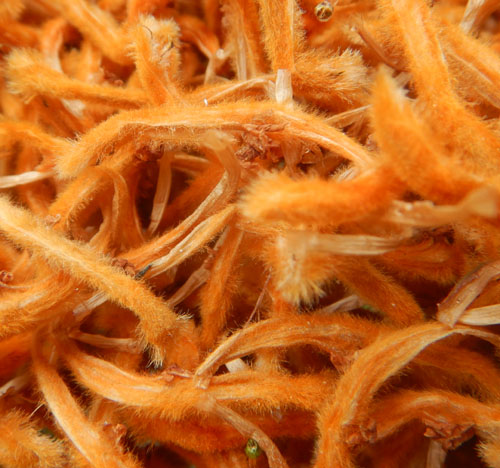Immediate shipping on plants.
Wilde Dagga (Leonotus leonurus), potted plant in a 4-inch deep pot, organic
$8.50
Family: Mint (Lamiaceae)
Hardy to Zones 9 to 12 (Wild dagga, Lion’s Tail, Lion’s Ears, Umunyane) Herbaceous or woody perennial. When growing in colder zones, these can be very late to re-emerge from the woody stumps of the previous year’s growth. Flowers in the late season on multiple upright stalks, occuring as long-tubed, hairy appendages emerging from the globose, whorled orbs. Hummingbirds become frenzied around this plant, and I’ve had them fly in through the door of the greenhouse (and risk hitting their little heads) in order to repeatedly visit a single flower that was making an out-of-season display. Easily one of the showiest medicinals of all time. Native to South Africa and planted in discriminating botanical gardens worldwide. When encountered on garden path, it is a breathtaker. Traditional usage (South African Tribes): orange flowers are a smokeable euphoric, external wash against snakebite, other bites and stings, boils, eczema, skin diseases, itching, and muscular cramps, coughs, colds, influenza, bronchitis, high blood pressure and headaches. The plant is powerfully endowed with marrubiin and related compounds. Plant prefers full sun to part shade and regular garden or wayside conditions. Since the stems can become quite woody, it holds up well to traffic and random abuse. Well-drained, slightly alkaline soils seem to be the best choice, although almost any soil will work as long as the summer is hot and long. The plant is quite drought tolerant. Space plants 3 feet apart. In cold weather areas, you may wish to keep this plant in potted culture.
Potted plant in a 4-inch deep pot, Certified Organically Grown
Out of stock






Question
nancetyler –
Hello Richo, Will Leonotus Loenurus self-pollinate if one singular plant is visited by a pollinator? And if so, would harvested seeds from a singular self-pollinated plant be viable?
Upvote if this was helpful (0) Downvote if this was not helpful (0) Watch Unwatch Flag for removal
Richo Cech –
hi nance, i’ve had trouble getting them to “take” when growing singly. When a clump of several plants is growing and flowers visited by hummingbird then yes, we get seeds. I think any seed that is solid is viable. richo
Upvote if this was helpful (0) Downvote if this was not helpful (0) Flag for removal
Question
Erica Reyes –
Will this be back in stock this season?
Upvote if this was helpful (0) Downvote if this was not helpful (0) Watch Unwatch Flag for removal
Mayche Cech –
Hi Erica, the wilde dagga is in stock and they are exceptional. Richo
Upvote if this was helpful (0) Downvote if this was not helpful (0) Flag for removal
Anita Gillispie –
Hi Richo. I’m in Zone 7a and growing Wild Dagga right now. Is there any way I could over-winter them for next year? Thanks.
Upvote if this was helpful (0) Downvote if this was not helpful (0) Flag for removal
Richo Cech –
Hello Anita, Wilde dagga remains aerial in zones 9 to 12 and acts like an herbaceous perennial in zones 7 and 8. They may overwinter, although it isn’t guaranteed. I have one under the dripline against the south side of the seedhouse that has been there for many years. If you choose a similar site, you can readily overwinter the plant in a zone 7. richo
Upvote if this was helpful (0) Downvote if this was not helpful (0) Flag for removal
Dreya K –
Do you think it would be possible to overwinter in a pot, perhaps dormant and in a cool dark space? I’m borderline zone 6b/7a – a Brown Turkey fig tree will die back to the ground but resprout here and may even set fruit, though we’ve never gotten it to ripen in time.
Upvote if this was helpful (0) Downvote if this was not helpful (0) Flag for removal
Richo Cech –
hello dreya, yes, the wilde dagga is good at senescing in the fall and reawakening in the spring. cut back and keep warm and in the light. richo
Upvote if this was helpful (0) Downvote if this was not helpful (0) Flag for removal